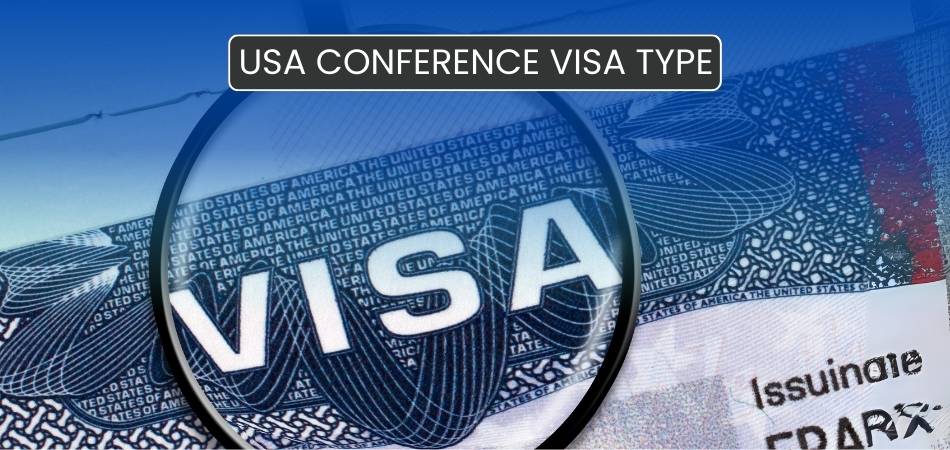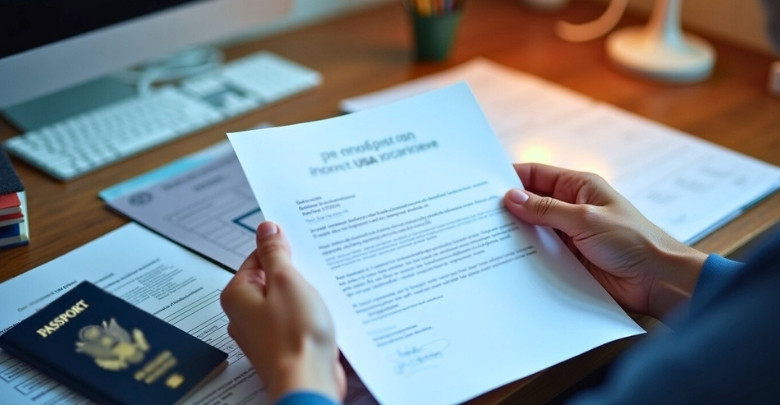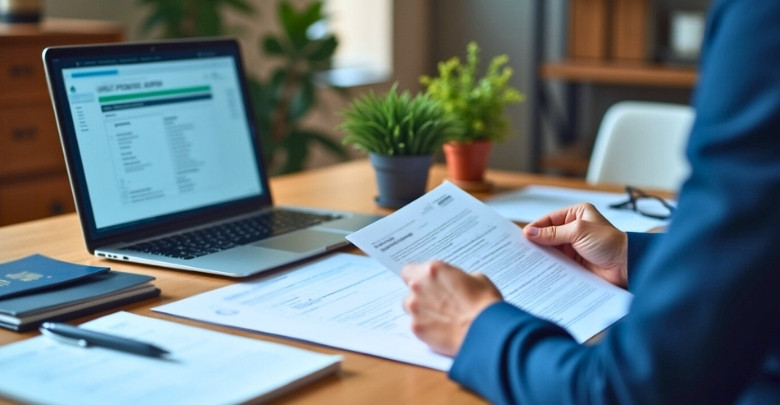Before you pack your bags for a conference in the US, you have one crucial thing to consider: the right visa. You might be thinking, “Do I need a special visa to attend a conference?” Or perhaps you’re curious about the types of visas available for such events. Knowing the USA conference visa types is essential to ensuring you have the correct documentation for a smooth trip.
A USA conference visa type, such as B1, B2, or J-1, is required depending on the nature of your visit. These visa types serve different purposes if you’re attending for business, personal enrichment, or academic purposes. The B1 visa is for business-related conferences, the B2 visa for general attendees, and the J-1 visa for academic or cultural exchange events.
Are you curious about how to apply, what documents you need, or how long the process might take? Keep reading this article to find all the important details about securing your USA conference visa type. You’ll find everything you need to know to plan a smooth and successful trip.
USA Conference Visa Type: Which One Suits Your Purpose?
Securing the right visa is essential for attending professional events in the U.S. Different visa categories apply based on the purpose of the visit. Choosing correctly helps avoid travel issues and ensures smooth entry. Let’s find out which visa suits your purpose.
B1 Visa for Business Conferences
The B1 visa is designed for professionals participating in business-related events. It allows individuals to attend conferences, negotiate contracts, or meet industry peers. Applicants must prove they are not engaging in paid work while in the U.S. Submitting strong documentation, such as invitation letters and financial proof, increases the chances of visa approval.
B2 Visa for General Attendees
A B2 visa is suitable for those attending conferences in USA for educational or personal enrichment. It is commonly issued to visitors who are not directly involved in business activities. This visa also allows attendees to explore the country during their stay. Demonstrating sufficient funds and strong ties to one’s home country is essential for approval.
J-1 Visa for Academic Conferences
Scholars, researchers, and students attending academic events may require a J-1 visa. This visa supports cultural and educational exchanges, including university-sponsored conferences and research collaborations. Sponsorship from an accredited academic institution is typically necessary. Ensuring all eligibility criteria are met simplifies the application process and improves the likelihood of a successful outcome.
Essential Documents for Visa Approval
A complete visa application includes a valid passport, a conference invitation letter, and proof of financial stability. Supporting documents, such as hotel bookings and travel itineraries, help strengthen the case. Providing a clear explanation of the visit’s purpose reassures immigration officers. Submitting accurate and well-organized documents reduces the risk of delays or rejection.
Visa Interview and Approval Process
During a visa interview, the applicant explains their intentions, financial situation, and travel plans. Officers ask questions about the purpose of the visit and the ability to cover expenses. Confidence and honesty in responses help establish credibility. Carrying all the required documents ensures a smooth interview process with minimal complications.
Duration and Limitations of Stay
The length of stay depends on the visa type and the consular officer’s decision. Typically, conference attendees are allowed short-term visits, ranging from a few days to six months. Extensions are possible but require a valid reason. Overstaying beyond the permitted period may result in visa violations and difficulties with future applications.
Applying for a Visa Extension
Conference attendees may need additional time in the U.S. due to extended events or unforeseen circumstances. A visa extension request requires submitting Form I-539 before the authorized stay expires. A strong justification, such as an updated event schedule, improves the chances of approval. Delays in applying for an extension may result in legal complications.
Key Differences Between a Business Visa and a Tourist Visa for Conferences
Selecting the right visa is essential when traveling to the U.S. for a conference. While both business and tourist visas allow entry, they serve different purposes. Attendees must apply for the visa that aligns with their activities during the visit. Knowing these differences helps avoid travel issues and ensures a smooth entry process.
Purpose of Travel
A business visa (B1) is for individuals attending professional events, meetings, or networking sessions. It allows participants to engage in business-related discussions without seeking employment. A tourist visa (B2) is primarily for leisure, sightseeing, and informal participation in public events. Using the wrong visa type may lead to complications during immigration checks.
Eligibility and Application
Applicants for a B1 visa must provide an invitation letter or proof of a business-related purpose. Financial documents, return travel plans, and intent to leave the U.S. are key factors in approval. A B2 visa requires general travel details but does not demand business-related proof. Both visa types require applicants to demonstrate strong ties to their home country.
Participation in Conferences
A B1 visa allows active involvement in conferences, including speaking engagements and networking with professionals. Attendees can participate in business discussions but cannot accept payment for services. A B2 visa is suitable for individuals attending as spectators or for personal knowledge. Engaging in official conference activities on a B2 visa may lead to visa violations.
Permitted Activities During Stay
B1 visa holders can attend business events, negotiate contracts, and participate in trade shows. However, they cannot engage in work or receive payment from a U.S.-based employer. B2 visa holders are limited to tourism, sightseeing, and non-business-related activities. If an attendee plans to engage in both tourism and business activities, a B1/B2 visa is recommended.
Required Documentation
An official invitation letter, proof of employment, and financial stability are typically included in a B1 visa application. These documents confirm the applicant’s legitimate business purpose. A B2 visa application focuses on travel plans, accommodation details, and sufficient funds for the stay. Ensuring accurate documentation speeds up the visa approval process.
Length of Stay and Extensions
The U.S. government grants both visas with a typical validity of up to six months, depending on the traveler’s itinerary. Extensions are possible but require strong justification, such as an extended conference schedule. Overstaying beyond the permitted duration can lead to penalties or future visa restrictions. Travelers should check the allowed period upon arrival to avoid violations.
Do You Need an Invitation Letter for a USA Conference Visa?
Visa applications for U.S. conferences may require supporting documents to prove the purpose of travel. An invitation letter is one such document that can strengthen an application. While not always mandatory, it can help demonstrate legitimacy to immigration officers. Having the right paperwork in place increases the chances of visa approval.
Purpose of an Invitation Letter
An invitation letter serves as proof that the applicant has a valid reason to attend a conference. It confirms participation and provides key event details. Immigration officers use it to verify the authenticity of the trip. A well-drafted letter supports the applicant’s case and adds credibility to the visa request.
When an Invitation Letter is Required
Not all U.S. visa applicants need an invitation letter, but certain cases benefit from one. Applicants with limited travel history or weak financial proof may need additional support. Conference organizers often provide letters upon request to help with visa applications. Checking embassy requirements ensures clarity on whether it is necessary.
Information Included in the Letter
A proper invitation letter contains essential details such as the conference name, date, and location. It also includes the attendee’s name, role, and purpose of participation. Organizers often add their contact details for verification. Clear and complete information ensures that the letter meets visa application requirements.
How to Request an Invitation Letter
Conference organizers typically issue invitation letters to registered attendees. Applicants should contact the event host or registration team after confirming participation. Providing personal details, including passport information and professional background, helps speed up the process. Requesting the letter early ensures there is enough time for visa submission.
Alternative Documents for Visa Approval
If an invitation letter is unavailable, alternative documents can support the application. A conference registration receipt, payment confirmation, or official event schedule can serve as proof. These documents confirm the attendee’s intent and involvement in the event. Having multiple proofs strengthens the visa application.
Applicants should review visa requirements before applying to avoid last-minute issues. By searching for conferences in the USA, attendees can find events that provide necessary documentation. Submitting a well-prepared application with supporting documents increases the chances of approval. A complete and accurate submission ensures a hassle-free visa process.
How to Prepare for Your USA Conference Visa Interview?
A visa interview is a crucial step in securing approval for attending a U.S. conference. Applicants must present a strong case to convince immigration officers of their intent. Proper preparation increases the chances of success and reduces unnecessary stress. Having the right documents and confidence during the interview makes a positive impression.
Gather All Required Documents
Carrying the correct documents ensures a smooth interview process. Essential paperwork includes a valid passport, visa application confirmation, and financial proof. A conference invitation letter or registration receipt helps validate the purpose of travel. Organizing these documents in advance prevents last-minute complications and delays.
Be Ready to Explain Your Conference Plans
Visa officers may ask about the event’s purpose and your role in it. Providing clear answers about the conference name, location, and duration helps establish credibility. Attendees should also explain how the event benefits their professional or academic goals. A well-prepared response makes a strong case for visa approval.
Demonstrate Financial Stability
Proof of sufficient funds reassures officers that the applicant can afford the trip. Bank statements, employment verification, and sponsorship letters serve as strong financial evidence. Showing financial readiness reduces concerns about overstaying or seeking employment. A stable financial background strengthens the overall visa application.
Show Ties to Your Home Country
Officers assess whether applicants have strong reasons to return home. Proof of employment, property ownership, or family ties supports this requirement. A clear explanation of professional commitments after the conference reassures officers of the applicant’s intent. Providing strong home-country ties improves the chances of approval.
Answer Questions Clearly and Confidently
A confident and honest approach leaves a positive impression during the interview. Responses should be clear, direct, and relevant to the officer’s questions. Nervousness or hesitation may raise unnecessary doubts about the application. Practicing common questions beforehand helps applicants respond smoothly.
Be Aware of the Interview Duration
Being well-prepared for the interview ensures a quick and smooth process without unnecessary delays. The duration of US conference visa interviews varies based on individual cases. Some may last only a few minutes, while others require detailed questioning. Answering promptly and providing accurate information helps speed up the interview.
Frequently Asked Questions
If you’re planning to attend a conference in the U.S., you likely have many questions about the visa process. In this section, we’ve answered some common queries to help guide you through the application and ensure you have all the necessary information for a successful trip.
Can I Attend Multiple Conferences on a Single USA Conference Visa?
Yes, it’s possible to attend multiple conferences on a single USA conference visa, provided the conferences are within the visa’s approved duration and scope. It’s essential to have documentation or proof of each event, such as registration details, to support your purpose during the visa interview.
Do I Need to Provide Proof of Accommodation for a USA Conference Visa?
Yes, providing proof of accommodation is generally required when applying for a USA conference visa. This could include hotel reservations or an invitation letter from the conference organizers stating that lodging arrangements have been made for the applicant.
Can I Switch to a Different Visa Type After Arriving in the USA on a Conference Visa?
Switching to a different visa type while in the USA is generally not allowed without leaving the country. If you wish to change your visa status, you must apply for the new visa from outside the U.S. or through a formal process, such as applying for a change of status with USCIS.
Are There Any Restrictions on Attending Business Meetings with a B2 Tourist Visa?
While the B2 tourist visa is for leisure travel, attending business meetings may be acceptable if it doesn’t involve formal employment or salary payments. However, engaging in paid work or contractual obligations on a B2 visa is not allowed and could lead to visa violations.
How Do I Prove That I Will Return to My Home Country After Attending the Conference?
To prove your intent to return home, you must provide strong ties to your country. This includes documentation like employment verification, proof of property ownership, family connections, or financial obligations. Showing that you have clear reasons to return helps convince the consular officer of your intent.
What Are the Chances of a USA Conference Visa Rejection?
The chances of rejection depend on several factors, such as incomplete documentation, lack of financial proof, or insufficient ties to your home country. Ensuring you provide all requested information and present your case clearly can significantly reduce the risk of a visa denial.
Do I Need Health Insurance for a USA Conference Visa?
While health insurance is not a strict requirement for a USA conference visa, it is strongly recommended. Having travel insurance that covers medical emergencies can prevent unexpected costs and help ensure that you have coverage during your stay. It may also be required by some visa sponsors or conferences.
What Should I Do If My USA Conference Visa Is Denied?
If your USA conference visa is denied, you will receive an explanation from the consulate officer. Depending on the reason, you can either appeal the decision or apply for a new visa with additional documentation that addresses the issue raised during the interview.
Can I Apply for a USA Conference Visa If I Am Self-Employed?
Yes, self-employed individuals can apply for a USA conference visa. It is necessary to provide supporting documents like business registration details, tax records, and financial statements to prove that you are financially stable and that your conference attendance is legitimate.
Can I Apply for a USA Conference Visa If I Have a Criminal Record?
Having a criminal record may complicate your visa application process. Depending on the severity of the conviction, you may need to submit additional documents, such as a court record or a waiver, to prove that you are eligible for a visa. Consulting with an immigration attorney is advisable.
Do I Need to Provide Biometric Information for a USA Conference Visa?
In most cases, biometric data, including fingerprints and photographs, is required during the USA conference visa application process. This is part of the visa screening procedure and helps verify your identity during entry into the United States. The biometric appointment is typically scheduled after your initial application.
Final Thought
Securing the right visa is essential for attending any conference in the USA. Choosing the correct USA conference visa type ensures you are following the rules and prevents any issues at immigration. By knowing which visa suits your purpose, you can ensure a smooth experience.
The USA conference visa you require depends on whether you’re attending for business, leisure, or academic purposes. The B1 visa is ideal for business events, the B2 for general attendees, and the J-1 for academic conferences or research exchanges. Being aware of these options helps streamline the application process.
As you move forward, remember to stay organized and gather all necessary documents before applying. Ensure your application is complete and accurate to avoid delays.








